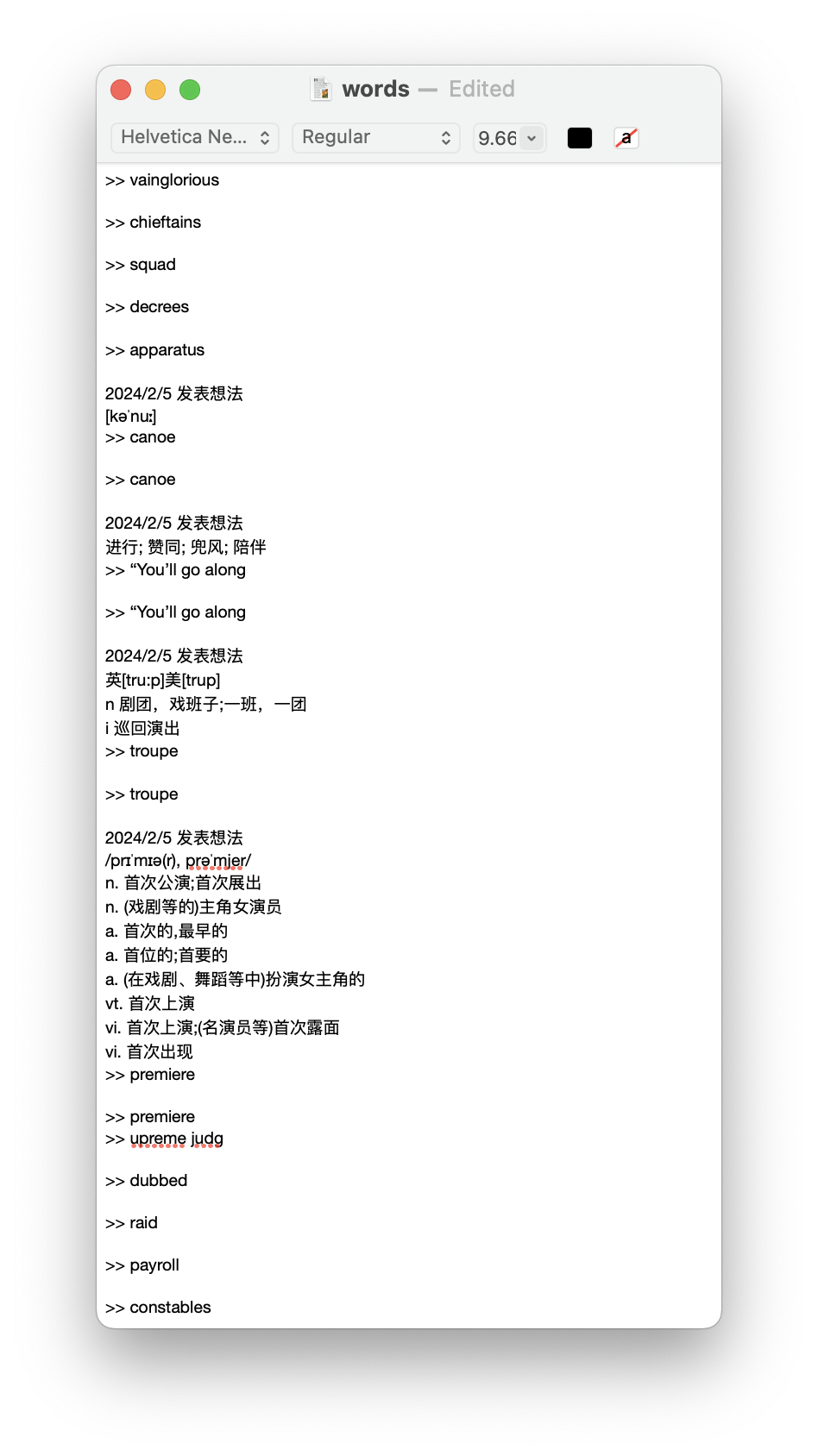Python in use
Capturing English vocab using Regex
I have been using Python for a while and have recently come to realize how useful it is. This blog is intended to preserve codes I’ve created for my personal use.
I enjoy reading books in English on Wechat Reading (WR), though I am not much into Wechat itself. In recent years, WR has increasingly equipped itself with functions assisting readers in engaging with English books such as notes, lookup, auto-translation and pronunciation, etc. Among these, taking notes is as crucial as looking up for me. I have, therefore, underlined tons of English vocab while writing down notes.
However, whenever I want to extract the vocab from my notes on WR, the thing bothered me lot was that WR exports all underlined vocab and its notes where I left notes both in English and Chinese. How can I pull out the vocab without any Chinese characters and duplicates?

My solution is to use Regular Expressions (Regex). Let me start by writing an outline of the code:
import re
text = '''....'''
pttn = r'...'
re.findall(pttn, text)
I found the extracted list is a list with the vocab preceded by >> and that most of the vocab I marked has more than 5 characters. Then I defined the pattern as follows:
pttn = r'>> (\w{5,})'
I used \w here instead of \b[a-zA-Z]\b because there are no 0-9 in English words. On top of this, I limited the number of characters to a minimum of 5 to exclude articles (e.g., a, the), prepositions (e.g., from, in, with), and pronouns (e.g., I, you, he, she). Finally, I put \w{5,} in ( ). This way, the captured words will not be prefixed with >> . Take a look at » (\w{5,}). Looks good.
Sequentially, I find all matches and remove duplicates by converting the list to a set:
ls = set(re.findall(pttn, text))
To facilitate reading, let me print it out:
for word in ls:
print(word)
Lastly, put the list in text and run the test:
import re
text = '''
>> vainglorious
>> chieftains
>> squad
>> decrees
>> apparatus
2024/2/5 发表想法
[kəˈnuː]
>> canoe
>> canoe
2024/2/5 发表想法
进行; 赞同; 兜风; 陪伴
>> “You’ll go along
>> “You’ll go along
2024/2/5 发表想法
英[tru:p]美[trup]
n 剧团,戏班子;一班,一团
i 巡回演出
>> troupe
>> troupe
2024/2/5 发表想法
/prɪˈmɪə(r), prəˈmjer/
n. 首次公演;首次展出
n. (戏剧等的)主角女演员
a. 首次的,最早的
a. 首位的;首要的
a. (在戏剧、舞蹈等中)扮演女主角的
vt. 首次上演
vi. 首次上演;(名演员等)首次露面
vi. 首次出现
>> premiere
>> premiere
>> upreme judg
>> dubbed
>> raid
>> payroll
>> constables
'''
pttn = r'>> (\w{5,})'
ls = set(re.findall(pttn, text))
for word in ls:
print(word)
upreme
payroll
troupe
premiere
decrees
squad
canoe
dubbed
constables
vainglorious
chieftains
apparatus
This is exactly what I want! Let me wrap up by writing the above into a function named capture_words:
def capture_words(text):
pattern = r'>> (\w{5,})'
ls = set(re.findall(pttn, text))
for word in ls:
print(word)
capture_words('''>> hahahah >> testtttt ''') # test
hahahah
testtttt
However, the function is not a perfect solution pulling out the vocab, as there are some words (less than 5 characters) missed such as raid . I will keep tweaking the code for a more comprehensive solution.